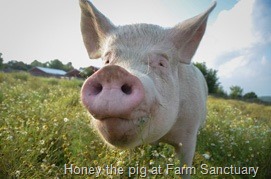Paper Concludes Pigs Are Behaviorally, Cognitively, Emotionally Complex Individuals

With intriguing descriptions of the abilities of pigs, a new white paper concludes that “pigs are not very different from the dogs and cats we share our homes with. They may even be not very different from ourselves.”
Written by Kimmela Executive Director Lori Marino and Emory University Prof. Christina M. Colvin, the paper is entitled Thinking Pigs: Cognition, Emotion, and Personality – An Exploration of the Cognitive Complexity of Sus Domesticus, The Domestic Pig.
The authors conclude that pigs:
- have excellent long-term memories;
- have a sense of time, remember specific episodes in their past, and anticipate future events;
- are whizzes with mazes and other tests requiring location of desired objects;
- love to play and engage in mock fighting with each other, similar to play in dogs and other mammals;
- live in complex social communities where they keep track of other individuals, both pigs and humans, and learn from one another;
- cooperate with one another and show signs of Machiavellian intelligence such as perspective-taking and tactical deception;
- are emotional and exhibit empathy;
- have distinct personalities.
Dr. Marino explains that “We have shown that pigs share a number of cognitive capacities with other highly intelligent species such as dogs, chimpanzees, elephants, dolphins, and even humans. There is good scientific evidence to suggest we need to rethink our overall relationship to them.”
Based on the authors’ review paper published in the International Journal of Comparative Psychology in 2015, this is the first white paper from The Someone Project. It is published by Farm Sanctuary and available here.
3 Replies to “Paper Concludes Pigs Are Behaviorally, Cognitively, Emotionally Complex Individuals”
Comments are closed.

Nancy – Thanks for your comment. I imagine that you are being humorous but let me answer more seriously. The reason pigs wallow in mud and other soft wet materials is to keep their skin moist. Just as we put moisturizer cream on our body they do the same because otherwise they dehydrate very quickly. Pigs are very sensitive to heat. So, although it may not seem very appealing to humans, this practice is extremely clever because the pigs are using whatever materials are available in their environment to keep themselves healthy. Now THAT’S smart!
I have wondered if there is any data or observations on the development of intelligence, emotions, and personality over the lifespan of pigs (or other animals). Speaking from my experience with many cats in the family I find that during their “kid” years, they are unsurprisingly more aggressive, playful, impulsive, etc., however in older age the personality really tends to come through with their vocalizations, habits, gestures, etc. I always wonder if this can be chalked up to the accumulation of experience or if it is more an issue of the latent personality coming out and showing more strongly once the aggressive/playful/energetic/reproductive periods are over. So, taking this back to pigs, is there anything that can be said about when and how the emotions, empathy, intelligence, etc., develop and what moderates them? For example, would a “house pig” who is frequently engaged by humans and tended to individually as a family pet develop significantly differently than a pig that was left to the barn and fields with its own kind?
I grew up on a farm where we raised a small number of pigs each year. The pigs had a shed and a fenced-in yard with a wallow area. They themselves kept their feces away from their food and wallow area. They were also extremely easy to teach tricks to, like those taught to dogs (sit, stay, come).
I presume commenting on pigs mixing everything together is due to your familiarity with factory farms: you put a bunch of animals together over concrete and throw their food in the floor with their feces and, not surprisingly, it will get mixed together. This says less about the stupidity of pigs than it does about the inhumanity of humans.